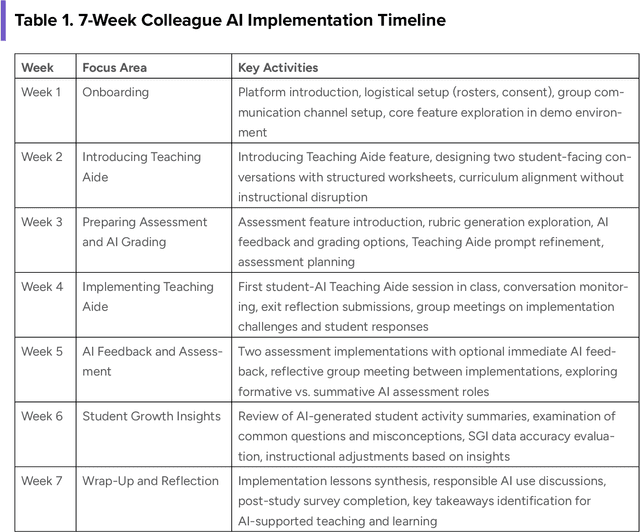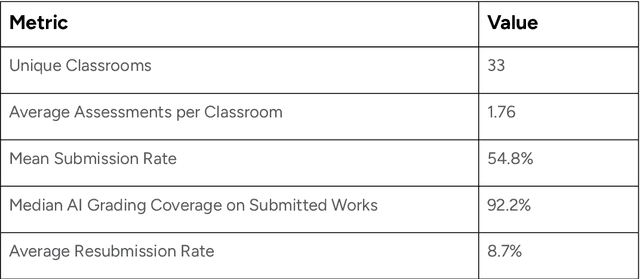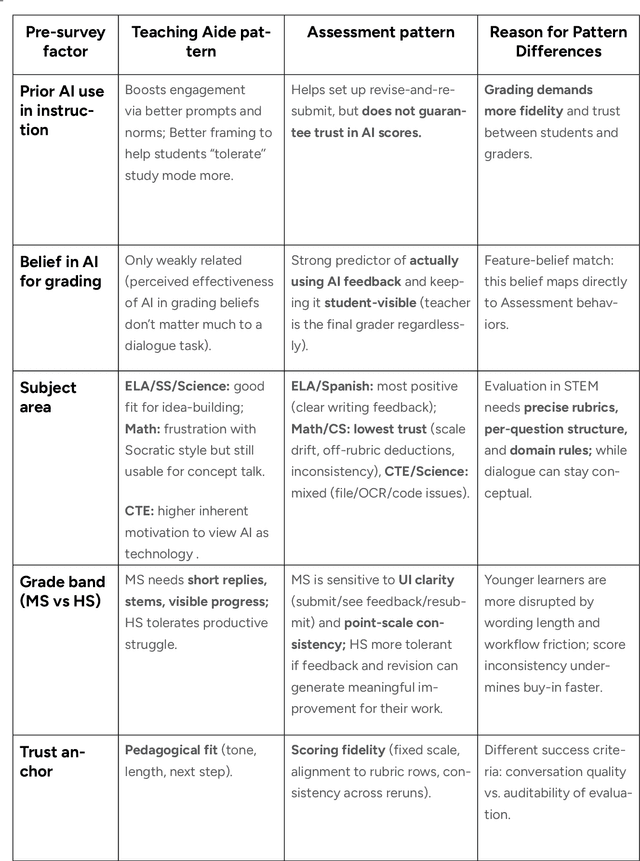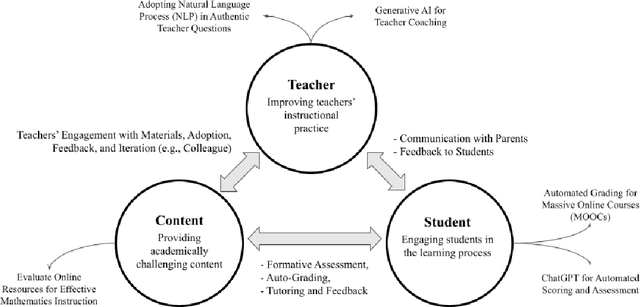Shawon Sarkar
AI as a Teaching Partner: Early Lessons from Classroom Codesign with Secondary Teachers
Dec 12, 2025


Abstract:This report presents a comprehensive account of the Colleague AI Classroom pilot, a collaborative design (co-design) study that brought generative AI technology directly into real classrooms. In this study, AI functioned as a third agent, an active participant that mediated feedback, supported inquiry, and extended teachers' instructional reach while preserving human judgment and teacher authority. Over seven weeks in spring 2025, 21 in-service teachers from four Washington State public school districts and one independent school integrated four AI-powered features of the Colleague AI Classroom into their instruction: Teaching Aide, Assessment and AI Grading, AI Tutor, and Student Growth Insights. More than 600 students in grades 6-12 used the platform in class at the direction of their teachers, who designed and facilitated the AI activities. During the Classroom pilot, teachers were co-design partners: they planned activities, implemented them with students, and provided weekly reflections on AI's role in classroom settings. The teachers' feedback guided iterative improvements for Colleague AI. The research team captured rich data through surveys, planning and reflection forms, group meetings, one-on-one interviews, and platform usage logs to understand where AI adds instructional value and where it requires refinement.
Decoding Instructional Dialogue: Human-AI Collaborative Analysis of Teacher Use of AI Tool at Scale
Jul 23, 2025Abstract:The integration of large language models (LLMs) into educational tools has the potential to substantially impact how teachers plan instruction, support diverse learners, and engage in professional reflection. Yet little is known about how educators actually use these tools in practice and how their interactions with AI can be meaningfully studied at scale. This paper presents a human-AI collaborative methodology for large-scale qualitative analysis of over 140,000 educator-AI messages drawn from a generative AI platform used by K-12 teachers. Through a four-phase coding pipeline, we combined inductive theme discovery, codebook development, structured annotation, and model benchmarking to examine patterns of educator engagement and evaluate the performance of LLMs in qualitative coding tasks. We developed a hierarchical codebook aligned with established teacher evaluation frameworks, capturing educators' instructional goals, contextual needs, and pedagogical strategies. Our findings demonstrate that LLMs, particularly Claude 3.5 Haiku, can reliably support theme identification, extend human recognition in complex scenarios, and outperform open-weight models in both accuracy and structural reliability. The analysis also reveals substantive patterns in how educators inquire AI to enhance instructional practices (79.7 percent of total conversations), create or adapt content (76.1 percent), support assessment and feedback loop (46.9 percent), attend to student needs for tailored instruction (43.3 percent), and assist other professional responsibilities (34.2 percent), highlighting emerging AI-related competencies that have direct implications for teacher preparation and professional development. This study offers a scalable, transparent model for AI-augmented qualitative research and provides foundational insights into the evolving role of generative AI in educational practice.
Enhancing Instructional Quality: Leveraging Computer-Assisted Textual Analysis to Generate In-Depth Insights from Educational Artifacts
Mar 06, 2024
Abstract:This paper explores the transformative potential of computer-assisted textual analysis in enhancing instructional quality through in-depth insights from educational artifacts. We integrate Richard Elmore's Instructional Core Framework to examine how artificial intelligence (AI) and machine learning (ML) methods, particularly natural language processing (NLP), can analyze educational content, teacher discourse, and student responses to foster instructional improvement. Through a comprehensive review and case studies within the Instructional Core Framework, we identify key areas where AI/ML integration offers significant advantages, including teacher coaching, student support, and content development. We unveil patterns that indicate AI/ML not only streamlines administrative tasks but also introduces novel pathways for personalized learning, providing actionable feedback for educators and contributing to a richer understanding of instructional dynamics. This paper emphasizes the importance of aligning AI/ML technologies with pedagogical goals to realize their full potential in educational settings, advocating for a balanced approach that considers ethical considerations, data quality, and the integration of human expertise.
Taking Search to Task
Jan 12, 2023Abstract:The importance of tasks in information retrieval (IR) has been long argued for, addressed in different ways, often ignored, and frequently revisited. For decades, scholars made a case for the role that a user's task plays in how and why that user engages in search and what a search system should do to assist. But for the most part, the IR community has been too focused on query processing and assuming a search task to be a collection of user queries, often ignoring if or how such an assumption addresses the users accomplishing their tasks. With emerging areas of conversational agents and proactive IR, understanding and addressing users' tasks has become more important than ever before. In this paper, we provide various perspectives on where the state-of-the-art is with regard to tasks in IR, what are some of the bottlenecks in deriving and using task information, and how do we go forward from here. In addition to covering relevant literature, the paper provides a synthesis of historical and current perspectives on understanding, extracting, and addressing task-focused search. To ground ongoing and future research in this area, we present a new framing device for tasks using a tree-like structure and various moves on that structure that allow different interpretations and applications. Presented as a combination of synthesis of ideas and past works, proposals for future research, and our perspectives on technical, social, and ethical considerations, this paper is meant to help revitalize the interest and future work in task-based IR.
 Add to Chrome
Add to Chrome Add to Firefox
Add to Firefox Add to Edge
Add to Edge